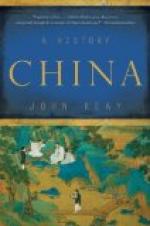Until the time of the “Manchurian incident” (1931), the Nanking government steadily grew in strength. It gained the confidence of the western powers, who proposed to make use of it in opposition to Japan’s policy of expansion in the Pacific sphere. On the strength of this favourable situation in its foreign relations, the Nanking government succeeded in getting rid of one after another of the Capitulations. Above all, the administration of the “Maritime Customs”, that is to say of the collection of duties on imports and exports, was brought under the control of the Chinese government: until then it had been under foreign control. Now that China could act with more freedom in the matter of tariffs, the government had greater financial resources, and through this and other measures it became financially more independent of the provinces. It succeeded in building up a small but modern army, loyal to the government and superior to the still existing provincial armies. This army gained its military experience in skirmishes with the Communists and the remaining generals.
It is true that when in 1931 the Japanese occupied Manchuria, Nanking was helpless, since Manchuria was only loosely associated with Nanking, and its governor, Chang Hsueeh-liang, had tried to remain independent of it. Thus Manchuria was lost almost without a blow. On the other hand, the fighting with Japan that broke out soon afterwards in Shanghai brought credit to the young Nanking army, though owing to its numerical inferiority it was unsuccessful. China protested to the League of Nations against its loss of Manchuria. The League sent a commission (the Lytton Commission), which condemned Japan’s action, but nothing further happened, and China indignantly broke away from her association with the Western powers (1932-1933). In view of the tense European situation (the beginning of the Hitler era in Germany, and the Italian plans of expansion), the Western powers did not want to fight Japan on China’s behalf, and without that nothing more could be done. They pursued, indeed, a policy of playing off Japan against China, in order to keep those two powers occupied with each other, and so to divert Japan from Indo-China and the Pacific.
China had thus to be prepared for being involved one day in a great war with Japan. Chiang Kai-shek wanted to postpone war as long as possible. He wanted time to establish his power more thoroughly within the country, and to strengthen his army. In regard to external relations, the great powers would have to decide their attitude sooner or later. America could not be expected to take up a clear attitude: she was for peace and commerce, and she made greater profits out of her relations with Japan than with China; she sent supplies to both (until 1941). On the other hand, Britain and France were more and more turning away from Japan, and Russo-Japanese relations were at all times tense. Japan tried to emerge from her isolation by joining the “axis powers”, Germany and Italy (1936); but it was still doubtful whether the Western powers would proceed with Russia, and therefore against Japan, or with the Axis, and therefore in alliance with Japan.




